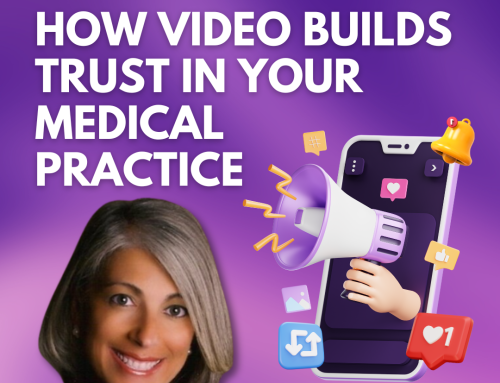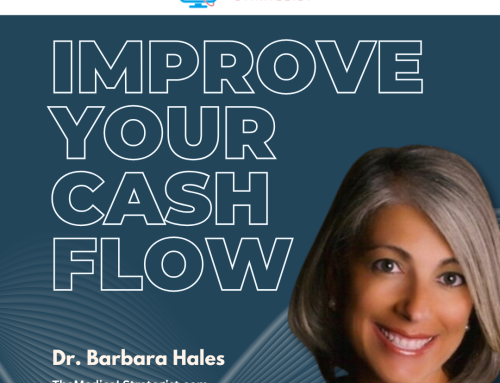Podcast: Play in new window | Download
Subscribe: RSS
In this episode, Barbara, Matt and Nick discuss:
-Why branding is important for health professionals
-What is the importance of using AdWords
-What is highly targeted messaging and why is it important
Key Takeaways:
“Break the rules and push against convention to stand out and succeed!”
Connect with Matt Reno & Nicholas Coleman:
Website: https://superkickbranding.com/
Podcast: https://thebrandoutlaw.com/
LinkedIn: https://www.linkedin.com/in/mattreno
: https://www.linkedin.com/in/nicholas-r-coleman
YouTube: https://www.youtube.com/@BrandOutlaw_Superkick
Connect with Barbara Hales:
Twitter: @DrBarbaraHales
Facebook: facebook.com/theMedicalStrategist
Business website: www.TheMedicalStrategist.com
Email: Barbara@barbarahalesmd.com
YouTube: https://www.youtube.com/TheMedicalStrategist
LinkedIn: www.linkedin.com/in/barbarahales
Books:
Content Copy Made Easy
14 Tactics to Triple Sales
Power to the Patient: The Medical Strategist
TRANSCRIPTION (128)
Dr. Barbara Hales: Welcome to another episode of marketing tips for doctors.
I’m your host, Dr. Barbara Hales.
Today we have a special treat, a duo, Matt Reno and Nick Coleman. They are co-owners of Superkick Branding, which created Brand Outlaw as a resource hub to drive the business world forward with advice, guidance, and tough love. What parent isn’t familiar with that? Through podcasts, videos, articles, and more, Brand Outlaw is the place where people at any career level in any industry can go to learn brand building with a fun, laid-back vibe.
Welcome to the show, guys.
Matt Reno: Thanks for having us, great to be here.
Dr. Barbara Hales: You both look like you exude a laid-back vibe.
Nicholas Coleman: Nice. Yeah, that’s what we go for.
Matt Reno: Yeah, absolutely. The best way to be creative is to have a relaxed mindset. So it helps us with problem-solving because it is a big part of how we go about helping our clients and just going about, sparking the creativity inside us.
Dr. Barbara Hales: Yeah, that and a lot of fun.
Nicholas Coleman: Yeah, we enjoy what we do. We want other people to enjoy this too.
Dr. Barbara Hales: Good. Now, you mentioned that you’re involved in podcasts. Are you talking about the podcasts you create for your clients or your own podcasts?
Nicholas Coleman: We have our own podcast, Brand Outlaw. So, no, we’re not in the business of creating podcasts for others. But we have our own, where people can listen to interviews with business leaders from all kinds of industries, hear success stories, hear the struggles that people went through to get to the top, and try to take some advice from them. And then we also have other episodes where it’s just Nick and I discussing different topics and breaking down some news or other items in the world of branding, business marketing, and what have you. So it’s fun, but there’s always some takeaway that you can apply to your own business.
Dr. Barbara Hales: So how did you come up with the name that you have now? Brand Outlaw, how did that come to be?
Nicholas Coleman: That it took a while took a lot of making lists and crossing stuff out. But what we were going for was to encourage people to take a little bit of a rebellious Maverick vibe to their business, to push against convention. Because if you’re following the herd and doing what everyone else is doing, you will not stand out. And then people need to have a reason to do business with you. We wanted to encourage our listeners, readers, or viewers to apply an outlaw mindset to their business and break the rules and push against convention so that they can stand out and succeed.
Dr. Barbara Hales: Do you have a tagline?
Nicholas Coleman: No, we don’t have a tagline, do we? No.
Matt Reno: Not at this point. Yeah. Because each business, especially at the beginning stage, focuses on what problem you solve. And then, as people know more about your brand over time, you can be more creative with the tagline. We wanted to keep it real simple and say, this is what we do. And we do this well. So when people come to our website or see our content, they immediately understand what we do.
Dr. Barbara Hales: Well, with such a great name that you have, it says it all you don’t need a tagline. Thanks. How did the two of you come to be in this business to begin with? What was the start of all?
Nicholas Coleman: Well, Nick and I worked together and had a marketing agency. He was my boss. And it started as a lead generation for that agency. But then we ended up leaving, and we decided we still wanted to work together on a freelance basis. So, we said, “hey, let’s take Brand Outlaw and turn it into the content arm of the business we were starting together”, which was Superkick Branding. And that’s the brand messaging consultancy, but we just loved making brand Outlaw content so much that we wanted to keep that.
Dr. Barbara Hales: How do you get your clients? What do you do to promote yourself and make others want to go into your services?
Nicholas Coleman: Well, I was going to say that Brand Outlaw is a big part of it. We use it to build credibility for ourselves and show, “hey, we know what we’re talking about, we have experience in this industry, and we can help other people.” So that’s one way we go about it.
Dr. Barbara Hales: Why would you say branding is important for health professionals? Doctors may say, “Well, I’m a doctor. I know I have a practice in whatever specialty that should speak for itself.” So, what would you tell them? And why would you say, “Well, you’re wrong.”
Nicholas Coleman: You may have very good reasons why people should choose you, and your current clients, and customers, know what that is. But it only sometimes speaks for itself. There’s so much else in this world speaking, and how will you cut through the noise just by doing good work? Doing good work, of course, is very important. But there are other things you need to be able to communicate what makes you different to the public, and that comes from branding or marketing. I know only some people love doing that. But it is important because you need to give people a reason to choose you over competitors.
Dr. Barbara Hales: Make sense. What things should you say people should avoid in branding and marketing for the health industry? What should they avoid?
Matt Reno: That’s a really good question. Because one of the things I avoid is using a lot of like jargon that your clients won’t understand. Like, a lot of times because if someone comes, say, onto their website, or they’re trying to understand your practice or specialty, they might write in a way that’s too technical. You want to keep your communication and messaging as simple as possible. So that way, when people come to your website and want to know about your practice, they’ll understand what you’re talking about and feel more personal with your practice. So, it is one thing we advise avoiding, especially regarding your communication.
Nicholas Coleman: And building off that, you want to think deeply about what problem you solve. So, for example, if you’re a dentist, clean teeth and take care of cavities, that’s the obvious thing. Okay. And that’s what every dentist can say. But if you can dive deeper and think about the problem beyond that physical tooth cleaning that you solve, that’s something like the confidence that comes from a clean smile or straight teeth. So think about those on a more emotional level. You don’t just clean teeth; you give people confidence.
Dr. Barbara Hales: Like we make you sexy.
Nicholas Coleman: Yeah, exactly.
Dr. Barbara Hales: Okay, what was the importance of using AdWords and Bing? How much should you be using?
Matt Reno: It’s absolutely important because here’s the reality. When looking at Google and Bing, these particular search engines and ads all sit at the top of the search. It’s incredibly hard to grow your practice, like doing it organically. I was thinking about this the other day. When I started in the industry, one ad was at the top of the search. And so you can grow your business organically. That’s why it was so important. But now you’ll have like about three ads that sit at the top, and then you also have your maps to show up. So you’re pushed way down, even if you’re on the first page, you’re almost near the bottom of the first page if you’re number one. So, if you want to make sure that people can find you easily, you need to run ads so that you’re at the top. Also, Google’s algorithms work because they are attached to your location. So, if you want to ensure that your location is always coming up wherever somebody is, having an ad and Google Maps right there at the top, it’s super easy for people to find you. And you have to make it that way for your customers.
Dr. Barbara Hales: That makes total sense. What would you say about social media? In regard to night positions?
Matt Reno: But, when it comes to it, it all depends on what your goal is. What are you trying to do with your social media? Because if you’re trying to be more nationally recognized, your intentions on social media will be about giving all these tips, being seen as an industry leader for what you do, and trying to push your practice. Make your social media more about your clients, community, or where you’re. Because from there, people will become more attached to the practice itself than who the actual doctor is. And that will allow these practices to grow because some of these practices want to hire more doctors, more staff, and stuff like that. So you have to make it about your practice being unbranded if that’s your intention with social media.
Dr. Barbara Hales: Absolutely. Tell me about the importance of creating highly targeted messaging.
Matt Reno: Oh, sure. This is one of our favorite things because it is about understanding your clients and where they’re at. So, often when people think, “Well, I’m going to write an ad, I’m going to do this broad”, like, “Here’s this family practice that’s in town. Come and see me.” People might be in different stages in their life. For example, someone may have just moved into town. So I’m going to write an ad that welcomes them to town and how to find the best practice in your neighborhood. Right? So, it’s thinking through, like, where’s this person at in their life, and can I write an ad that will make them stop and go, “Wow, these people understand what it is that I’m going through. And I want to want now to engage with this brand, and I want to reach out to them because there’s so helpful.” So that’s where we want to be intentional about. who are we talking to? And how can we help them and provide value to them?
Nicholas Coleman: Yeah, and we talked about this a lot, understanding where people are in the buyers’ journey and targeting your messaging for that stage. So, you’re going to have a different message for people who are just hearing about you for the first time than you are for people who are in that research stage where they’ve looked at a lot of options and are trying to choose which one to go with. And then that’s a different message from those who’ve already been to your practice, and you hope to have them as returning clients.
Dr. Barbara Hales: If they’re prospective patients, how do you know what stage they’re at?
Nicholas Coleman: That’s where you’re writing for your AdWords or other advertising, depending on which channel you’re in. You’re writing for those people who have never seen you before. But you can also have retargeting ads. Those people have interacted with you somehow, and you’re trying to get them from forgetting about your dropping off. So, it’s another reminder of why they should work with you. So, it depends on your channel when deciding what your message needs to be.
Dr. Barbara Hales: What are two tips you could give our listeners now that they could implement immediately?
Nicholas Coleman: What I would say is take a look at your visual branding, your website, and the messages on your website and compare them to your competitors, whether you’re local or whether your larger organizations, figure out who your competitors are, and do your little analysis and say, “am I standing out? Am I giving people a reason to notice my practice to choose mine over competitors? Or am I just blending in with everybody else?” So, for example, take a look at your logo. Again, back to dentists, Do you have a tooth or a smile in your logo? Well, you’re probably blending in. It would help if you figured something else out and then took steps. But do your competitive analysis and see if you have room for improvement.
Dr. Barbara Hales: That’s a very interesting thought for a moment. What logo would a dentist use to stand out without using a tooth or a smile?
Nicholas Coleman: That’s a good question. And that’s tough because of the tooth, the smile, and the obvious answers. So, for example, if we were working with a dentist, we would ask a lot of questions that go deeper about their target audience. What are the problems that they want to solve for their patients? And we would go deeper like I was talking about before. And we may come up with something abstract, or we may come up with something that’s a little more geographically based if they want to be known as the top in their area. It all depends. But, if you’re going with the obvious answer, you’re setting yourself up to blend in. I can’t give you an easy answer for that right now because it’s not easy, and it is a process of figuring it out. But that’s the hard work we do for clients, and you must do that work if you’re trying to stand out.
Dr. Barbara Hales: It’s crucial to sit down and put the work and the thought in. That is not an easy process you could very flippantly use a photo or an image that you get generically. You’re so right; people do have to work on that. Do you have a second tip?
Matt Reno: Sure. This is more on the practical side. Make sure that your Google My Business is filled in. Because when we’re talking about standing out, it’s more than just putting your address on Google My Business. It’s about listing all your services, and one of the most underutilized, especially for family practices and different types of actual hospitals, they utilize the photos sparingly. And this is like an area where you can show your customers your office; you can show many different things on Google My Business. If you have it filled out, it gives you a huge advantage. Because when somebody comes on and starts looking you up, it takes up the entire right side of Google search. And so, the more information, the more images, the videos you have, it takes up even more of that page. So, you want that dialed in, and it’s easy to do.
Dr. Barbara Hales: That’s a great tip. How can people listening reach you if they’d like to hear more?
Nicholas Coleman: We have a contact page on our website, superkickbranding.com. And they can also go to brandoutlaw.com, where you can find videos, podcasts, and articles. With tips that you can apply to your own business. We have a contact page there as well. So there are two ways to get a hold of us.
Dr. Barbara Hales: Well, we’ve heard some great tips and great information today. Thanks a lot, guys. This has been another episode of marketing tips for doctors with your host, Dr. Barbara Hales. Till next time.



